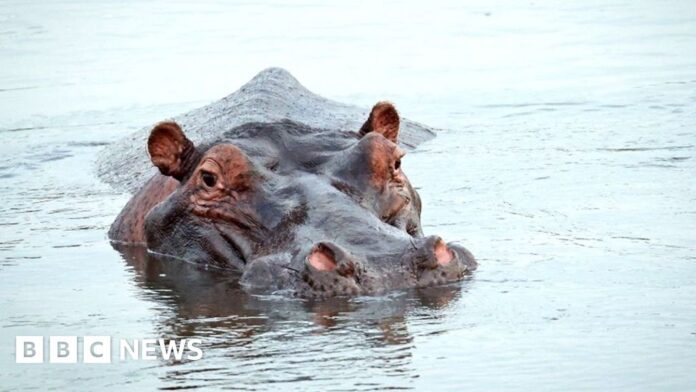Khanyisile NgcoboJohannesburg
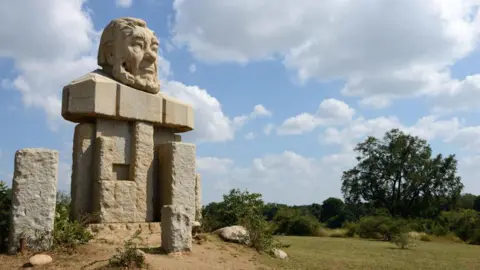 Corbis via Getty Images
Corbis via Getty ImagesSouth Africa’s world-famous Kruger National Park could become known by a new name if some local politicians have their way.
The vast wildlife sanctuary, called the Sabi Game Reserve at the time, was re-christened in 1926 to honour Paul Kruger. He was president in the late 19th Century of what was known as the South African Republic, which forms part of what is now the east of South Africa.
For Afrikaners, descendants of 17th Century European settlers, Kruger is revered as a hero who led the resistance against British colonialism.
But for the majority of South Africans, he is viewed as a relic of the country’s racist past, as he was one of those responsible for driving black Africans off their land and excluding them from having a say in running the republic.
Many South African cities, towns, roads and other major infrastructure have been given new names since the end of the legalised system of racial discrimination, known as apartheid, and the beginning of the democratic era in 1994. Though sometimes controversial, the decisions have been justified as a way to break with what went before – both the apartheid and colonial era.
But the proposed Kruger name-change does not just touch on history, it also could have a bearing on the country’s fragile economy.
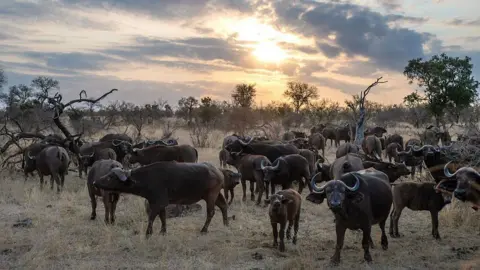 AFP via Getty Images
AFP via Getty ImagesThe national park, home to elephants, lions, hippos, leopards and many other animals, attracts almost a million visitors a year, and is a jewel in the crown of South Africa’s tourism industry.
Some argue that changing Kruger’s name could threaten that.
Part of the park is in Mpumalanga province and in September, as the country celebrated Heritage Month, representatives from the opposition Economic Freedom Fighters (EFF) put forward a proposal in the region’s legislature to change Kruger’s name.
“How do we celebrate our heritage as South Africans when we still have our beautiful national parks named after the architect of apartheid Paul Kruger,” EFF representative Rhulani Qhibi was quoted as saying in a stirring speech. While not historically accurate, as apartheid in its legal form was introduced decades after Kruger’s death, the rhetoric reflects the way he is viewed by some.
The EFF also proposed the renaming of other key landmarks in the province, including the Kruger Mpumalanga International airport.
But in their haste to remove Kruger’s association with the park, the EFF, whose national leader is the firebrand MP Julius Malema, put forward another problematic name: Skukuza.
Skukuza, which means “he who sweeps clean” in the Tsonga language, was the nickname given to the park’s first warden, James Stevenson-Hamilton, who was known for driving out poachers and black communities that lived in the park in its early days, among other things.
The EFF leader in Mpumalanga, Collen Sedibe, was quoted in South African publication Sunday World as admitting the party’s blunder.
“We are still engaging with the land claimants at Kruger National Park and the people who were staying there because they said Skukuza is not the right name. He was the man who kicked them out of the park,” Sedibe said.
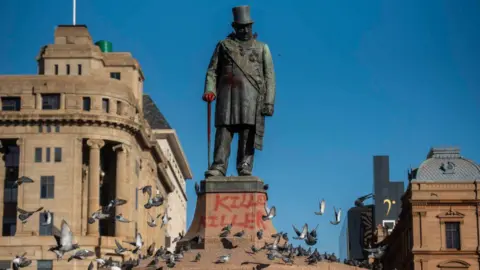 Gallo Images via Getty Images
Gallo Images via Getty ImagesAfrikaner lobby group AfriForum condemned the EFF’s proposal as “cheap politics and proof that political power-hunger in the province outweighs informed or responsible decision-making”.
The group vowed to mount legal challenges to any attempts to rename the park without due process and blasted the EFF for criticising its namesake.
“The Kruger National Park was created thanks to Kruger’s vision [and] to ignore Kruger’s contribution to the establishment of the country’s most important national park… is opportunistic and blatantly spreading lies,” AfriForum’s Marais de Vaal said in reaction to the news.
The motion to change the name was adopted by the provincial legislature after receiving support from its largest parties, the African National Congress (ANC), which is in power nationally, and uMkhonto weSizwe.
Despite it not being legally binding, as there is a national process that any name change needs to go through, detractors have warned that if approved it could damage the tourism sector, which contributes almost 9% to the country’s economy.
It could have “severe consequences… it might even dilute the international recognition of this park and South Africa as a tourism destination that we’ve built over so many years”, tourism expert Prof Elmarie Slabbert told the BBC.
There would also be the cost of having to rebrand the park.
The academic, a research director at the North West University’s school of tourism management, did acknowledge “that we need to honour indigenous heritage”.
“But the effect on the economy is going to be so significant that we need to decide where do we spend our money. We’ve got such a high unemployment rate at this point in time that I believe that is where the money should go.”
More than 30% of the working-age population are unemployed – ranked by the World Bank as one of the worst jobless rates of any nation – and youth unemployment is even higher.
But economics is not the only basis on which name-change decisions have been made.
The need to address the inequities of the country’s past has been seen as vital.
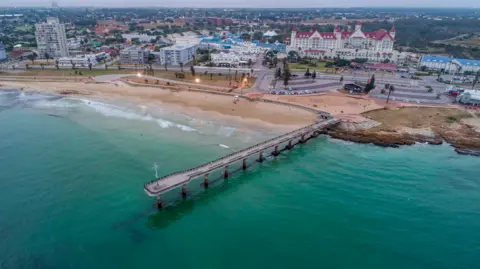 Getty Images
Getty ImagesFor instance, the name of former Prime Minister Hendrik Verwoerd, a key figure in implementing apartheid, has been removed from many places.
Other changes include the city of Port Elizabeth. Named after the wife of a 19th Century British official, it is now called Gqeberha, the Xhosa word for the river that runs through it. King William’s Town, after William IV, is now Qonce, also referring to a river.
Johannesburg’s international airport, once known as Jan Smuts – honouring a former prime minister – is now called OR Tambo, after the anti-apartheid leader and former president of the ANC.
Some cities, like the capital, Pretoria, have kept their monikers but the local government areas under which they come have been renamed.
Plenty of other renaming ideas have been floated, including changing the name of the Eastern Cape seaside town of Port Alfred, which commemorates Queen Victoria’s second son. Some have even suggested changing the country’s name to Azania.
Many of these proposals have divided public opinion, and to ensure that changes are not just made on a whim there is an extensive legal process that needs to be completed.
It is managed by the South African Geographical Names Council (SAGNC) and begins with an application either by individuals, communities or institutions to the body’s provincial branch.
The proposal is discussed and could lead to a public consultation. Once this has been concluded, the name-change plan is sent to the national office.
If it is thought to satisfy “all the requirements”, a recommendation will then be made to the sports, arts and culture minister for a final decision, SAGNC chairperson Dr Nkadimeng Mahosi told the BBC.
“What is happening here [in Mpumalanga’s legislature], does not go according to what the national act says… [and] is political point-scoring,” he said.
As a national landmark, and the fact that different government departments will need to have a say, Kruger is a unique case, Dr Mahosi added.
There are then several bureaucratic hurdles that need to be negotiated before the name Kruger ever disappears from tourism brochures.
But the debate has revealed the sensitivities that continue to exist around how to deal with the country’s past and the legacy of those who used to govern it.
More about South Africa from the BBC:
 Getty Images/BBC
Getty Images/BBC

